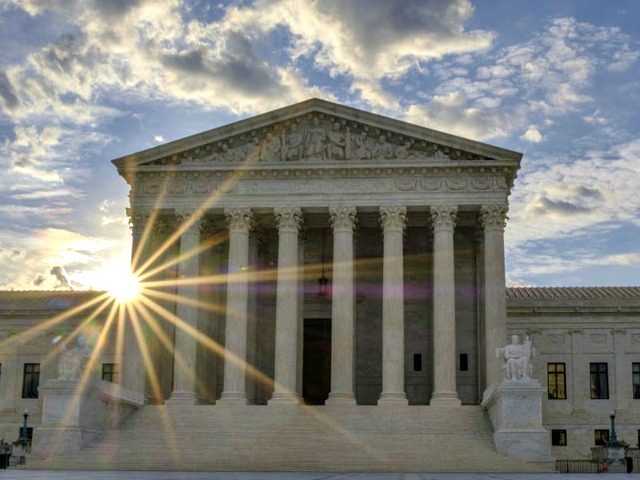WASHINGTON, DC – The Supreme Court on Monday completed its docket for the annual term that began in October 2017 and ends in June 2018, rounding out a term containing cases for the history books.
Each year the justices receive over 7,000 petitions for a writ of certiorari, the process by which parties ask the Court to review their case. They select about 80. While most cases are very technical legal issues that are not of general public interest, the current term has an unusually high number of newsworthy cases. Those 20 are listed below.
Already this term, the justices have heard 11 major cases. They are:
- In Masterpiece Cakeshop v. Colorado Civil Rights Commission, the Supreme Court will decide whether a Christian baker has any First Amendments rights of either free speech or the free exercise of religion to decline to custom-design a cake to celebrate same-sex marriage. It looks likely that the baker will win 5-4 on a narrow ground that will be very significant to people of faith, but not a decisive victory or loss that will resolve all these matters for both sides.
- In Carpenter v. United States, the Court will determine whether the government violates the Fourth Amendment when the government makes cellphone companies turn over their records of individual cell phone activities without a search warrant.
- In New Jersey Thoroughbred Horsemen’s Association v. National Collegiate Athletic Association, the justices will examine whether Congress’s statute regulating sports gambling that is legal under state law violates the Constitution’s Tenth Amendment.
- In Collins v. Virginia, the Supreme Court will decide whether the Fourth Amendment permits a police officer to examine a car parked outside a house without a search warrant.
- In another case involving cars, in Byrd v. United States the Court will determine whether Fourth Amendment search and seizure protections apply to a rental car driver if that driver is not listed on the rental agreement as having a legal right to drive the car.
- In Husted v. A. Philip Randolph Institute, the justices will examine what a state can and should do to remove ineligible persons from the state’s voter rolls consistent with federal law.
- In Sessions v. Dimaya, the Supreme Court will decide whether a key provision in the Immigration and Nationality Act for deporting aliens is so vague that it is unconstitutional.
- In Jennings v. Rodriguez, the Court will decide whether aliens who are subject to mandatory detention by the government must be afforded bond hearings, and that failing to do so means they must be released into the general public.
- In Gill v. Whitford, the nine justices will decide whether partisan gerrymandering (i.e., drawing legislative district lines to help the party in power) is unconstitutional, or on the flip side whether federal courts have no role in such political disputes.
- In Patchak v. Zinke, they will decide an important constitutional separation-of-powers question of whether Congress can pass a law instructing the courts is dismiss a particular federal case or group of cases that are already in the court system.
- In Oil States Energy Services v. Greene’s Energy Group, the Court will determine whether the process by the Patent and Trademark Office (PTO) can declare a patent invalid, and thus takes away the property rights the patent holder enjoyed, without a jury trial violates the Constitution’s Seventh Amendment.
The remaining nine cases of broad interest are yet to be argued. They are:
- In Janus v. AFSCME, the Court will decide whether to restore First Amendment protections to government-employed union workers who do not want to support leftwing government union political agendas, and in doing so overrule the infamously liberal Abood decision from 1977.
- In United States v. Microsoft, the High Court will consider whether a U.S.-based email service provider must hand over client emails that it stores on foreign soil if the U.S. government receives a search warrant from a judge for those emails.
- In Minnesota Voters Alliance v. Mansky, the Court will determine whether a Minnesota law that disallows any sort of political message at a polling place—such as a voter wearing a NRA hat or a “Don’t Tread on Me” t-shirt when he casts his ballot—is so much broader than necessary to prevent voter intimidation that it violates the First Amendment.
- In NIFLA v. Becerra, the justices will consider whether two provisions of California law compelling pro-life Crisis Pregnancy Centers to disclose information regarding abortion services and medical licensing violate the First Amendment.
- In Sveen v. Melin, they will decide whether it violates the Constitution’s Contracts Clause for a state to pass a law invalidating a previous contract where the private parties agreed to a marriage-related contract before that new law was enacted.
- In Lucia v. Securities and Exchange Commission, the Court will examine whether the SEC’s administrative law judges are “officers of the United States” who can only be appointed in a particular manner under the Constitution’s Appointments Clause.
- In South Dakota v. Wayfair, the Supreme Court will decide whether states are able to tax the Internet.
- In Abbott v. Perez, in a case out of Texas the Court will resolve several issues involving legal challenges to state legislative redistricting plans.
- In Trump v. Hawaii, the justices will decide several monumental questions regarding President Trump’s so-called “travel ban” found in Presidential Proclamation 9645, including the roles of Congress, the president, and the courts, and whether this policy is consistent both with federal law and the Constitution.
While it is possible that the Supreme Court could add a new case to the current term, except in the event of an emergency all additional cases should be scheduled for the Court’s new term, which begins on October 1.

COMMENTS
Please let us know if you're having issues with commenting.